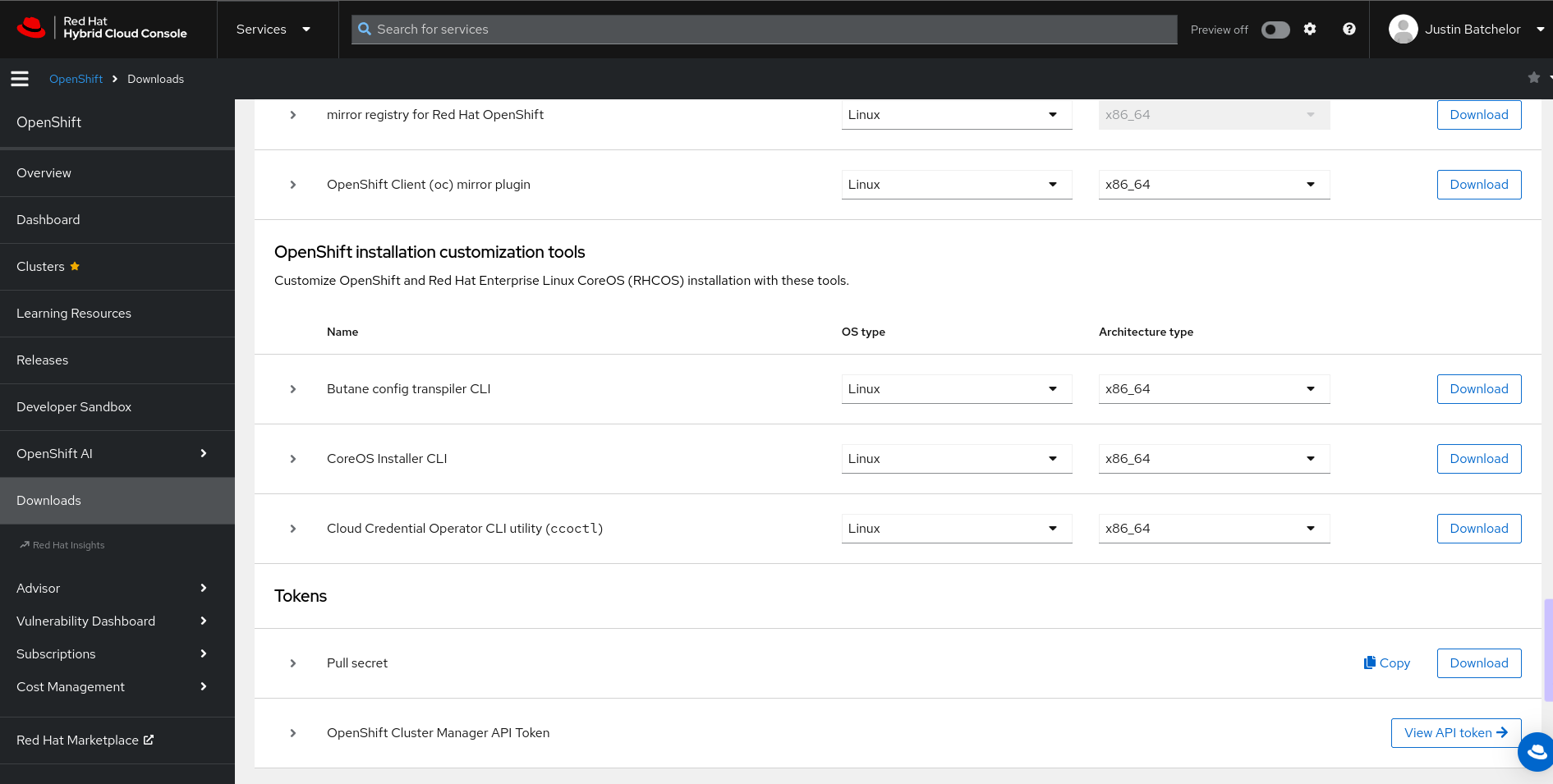Python module to implement the RedHat Assisted Installer API
Project description
red-hat-assisted-installer
Python package to implement the RedHat Assisted Installer API.
Description
Python package that implements the RedHat Assisted Installer API. This
Installation
pip install redhat-assisted-installer
Package Requirements
Packages
pip install requests
Environment Variables
-
REDHAT_PULL_SECRET: The pull secret associated with your RedHat Hybrid Cloud account -
REDHAT_OFFLINE_TOKEN: The offline token associated with your RedHat Hybrid Cloud account
You can find these credentials by navigating to https://console.redhat.com/openshift/overview. In the side panel navigate to Downloads, and at the bottom of the page you should see the pull secret and token
How to use
Create AssistedInstaller instance
# import package
import redhat_assisted_installer.assistedinstaller as assistedinstaller
# Method 1:
# set assisted installer token value as an evironment variable
os.environ['REDHAT_OFFLINE_TOKEN'] = <str> token
# set assisted installer pull_secret value as an evironment variable
os.environ['REDHAT_PULL_SECRET'] = <str> pull_secret
# Method 2:
# You can also set env in virtual environment `activate` file via export.. you may have to restart your session
# export REDHAT_OFFLINE_TOKEN= '<token>'
# export REDHAT_PULL_SECRET= '<pull_secret>'
# create installer instance
installer = assistedinstaller.assistedinstaller()
On init the class will lookup the environment variables specified in requirements, and attempt to set those as attributes of itself.
API ENDPOINTS Implemented
/v2/clusters
GET
Retrieves the list of OpenShift clusters.
Query Parameters
| name | type | description | required |
|---|---|---|---|
| openshift_cluster_id | string | A specific cluster to retrieve. | False |
| with_hosts | boolean | Include hosts in the returned list. | False |
| owner | string | returns only clusters that are owned by the specified user. | False |
EXAMPLES
import redhat_assisted_installer.assistedinstaller as assistedinstaller
installer = assistedinstaller.assistedinstaller()
# return all clusters associated with this account
clusters = installer.getClusters()
# return cluster by id... still returns an array so remember to access via index (i.e clusters[0])
clusters = installer.getClusters(cluster_id=<cluster_id>)
# return all clusters and include the hosts associated with each cluster
clusters = installer.getClusters(with_hosts=True=<bool>)
POST
Creates a new OpenShift cluster definition.
Body Parameters
| name | type | description | required |
|---|---|---|---|
| name | string | Name of cluster definition. | True |
| version | string | OpenShift version to use. | True |
| basedomain | string | The base dns domain to use for the cluster. | True |
| hamode | string | Determine if the cluster will be single node or highly available | False |
| cpuarchitecture | string | The cpu arch of the baremetal hardware this cluster will run on | False |
EXAMPLES
import redhat_assisted_installer.assistedinstaller as assistedinstaller
installer = assistedinstaller.assistedinstaller()
# create a single node openshift cluster running version 4.15
cluster = installer.postCluster("ocp-testing-sno", "4.15", "example.com")
# create a highly available cluster running 3 control plane nodes
cluster = installer.postCluster("ocp-testing-ha", "4.15", "example.com", hamode="Full")
/v2/clusters/{cluster_id}
DELETE
Deletes an OpenShift cluster definition.
Path Parameters
| name | type | description | required |
|---|---|---|---|
| cluster_id | string | The cluster to be deregistered. | True |
EXAMPLES
import redhat_assisted_installer.assistedinstaller as assistedinstaller
installer = assistedinstaller.assistedinstaller()
# get cluster by id
clusters = installer.getClusters(cluster_id=<cluster_id>)
# return object is an array, so we can safely delete any clusters with that id by using a for loop
for cluster in clusters:
installer.deleteCluster(cluster['id'])
/v2/infra-envs
GET
Retrieves the list of infra-envs.
Query Parameters
| name | type | description | required |
|---|---|---|---|
| cluster_id | string | returns only infra-envs which directly reference this cluster. | False |
| owner | string | returns only clusters that are owned by the specified user. | False |
EXAMPLES
import redhat_assisted_installer.assistedinstaller as assistedinstaller
installer = assistedinstaller.assistedinstaller()
# get all infra-envs registered to this account
infra_envs = installer.getInfrastructureEnvironments()
# get all infra-envs registered to this account
infra_envs = installer.getInfrastructureEnvironments()
# get all infra-envs that directly reference cluster_id
infra_env = installer.getInfrastructureEnvironments(cluster_id=<cluster_id>)
POST
Creates a new OpenShift Discovery ISO.
Body Parameters
| name | type | description | required |
|---|---|---|---|
| name | string | Name of cluster definition. | True |
| version | string | OpenShift version to use. | False |
| cluster_id | string | The cluster this infra-env will reference | False |
| cpuarchitecture | string | The cpu arch of the baremetal hardware this cluster will run on | False |
EXAMPLES
import redhat_assisted_installer.assistedinstaller as assistedinstaller
installer = assistedinstaller.assistedinstaller()
# create min infra-env
installer.postInfrastructureEnvironment(name="testing-infra")
/v2/infra-envs/{infra-env-id}
DELETE
Deletes an infra-env.
Path Parameters
| name | type | description | required |
|---|---|---|---|
| infra_env_id | string | The infra-env to be deleted. | True |
EXAMPLES
import redhat_assisted_installer.assistedinstaller as assistedinstaller
installer = assistedinstaller.assistedinstaller()
# get all infra-envs registered to this account
infras = installer.getInfrastructureEnvironments()
# return object is an array, so we can safely delete any infra-envs with that id by using a for loop
for infra in infras:
installer.deleteInfrastructureEnvironment(infra['id'])
References
Project details
Release history Release notifications | RSS feed
Download files
Download the file for your platform. If you're not sure which to choose, learn more about installing packages.
Source Distribution
Built Distribution
File details
Details for the file redhat_assisted_installer-0.2.5.tar.gz.
File metadata
- Download URL: redhat_assisted_installer-0.2.5.tar.gz
- Upload date:
- Size: 121.1 kB
- Tags: Source
- Uploaded using Trusted Publishing? No
- Uploaded via: twine/5.1.0 CPython/3.12.3
File hashes
| Algorithm | Hash digest | |
|---|---|---|
| SHA256 | ba57c1a7815b3aaa09952df3bce1d6956b5363a963f9712f66acf311b653b31d |
|
| MD5 | 24514313924a3b9a8af3a545bfe3b6a5 |
|
| BLAKE2b-256 | 34856d46aea48a2857f3a92f82df65b76e3ac29a7ba25d34ca1a8bba7e574ac8 |
File details
Details for the file redhat_assisted_installer-0.2.5-py3-none-any.whl.
File metadata
- Download URL: redhat_assisted_installer-0.2.5-py3-none-any.whl
- Upload date:
- Size: 9.1 kB
- Tags: Python 3
- Uploaded using Trusted Publishing? No
- Uploaded via: twine/5.1.0 CPython/3.12.3
File hashes
| Algorithm | Hash digest | |
|---|---|---|
| SHA256 | 2071d3f8b85ec05c92b85bf35eb7d72605a7c5469becae37355f188aad1a4f38 |
|
| MD5 | 7af16f157381ae421fe2b176e73e467a |
|
| BLAKE2b-256 | 28c3de49c01ebb7f4f62e84d2a2d1b36f13eabc8eea815c6d977f036e2bdc522 |












